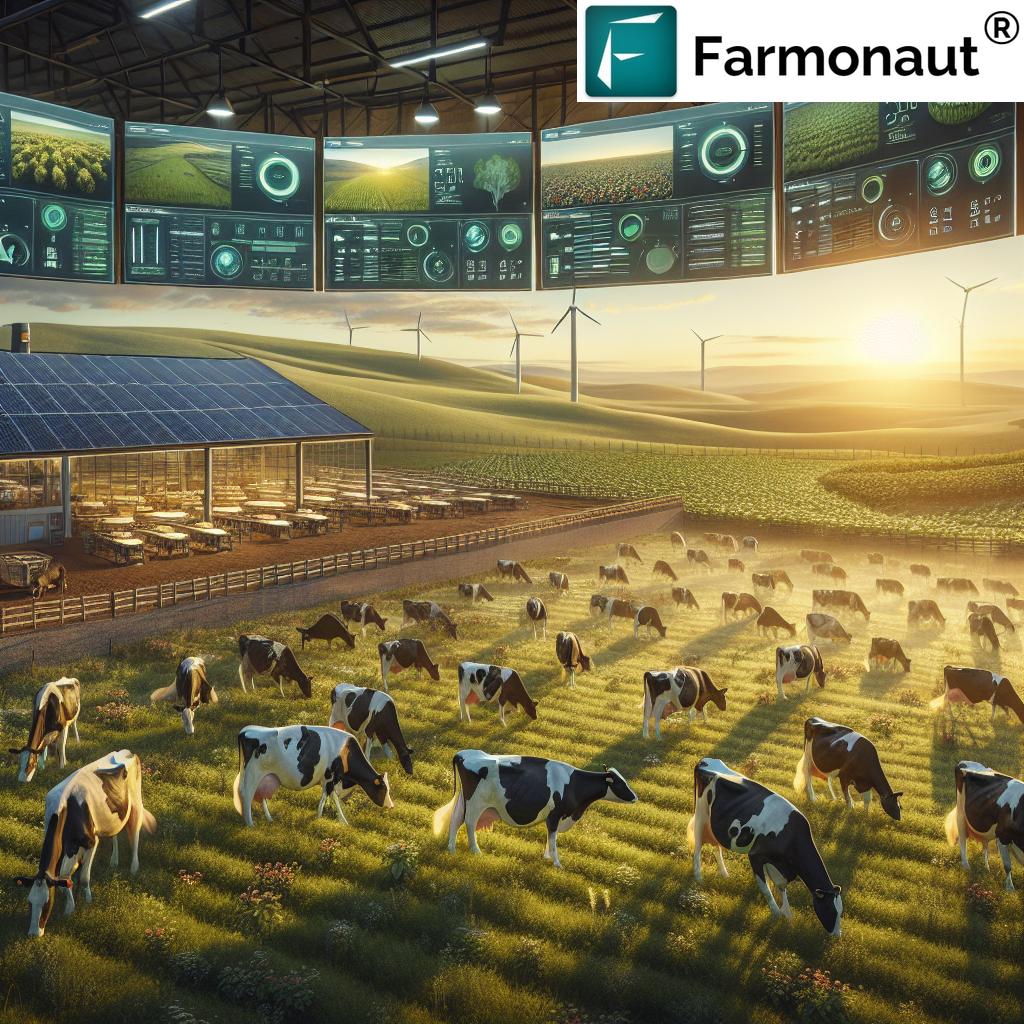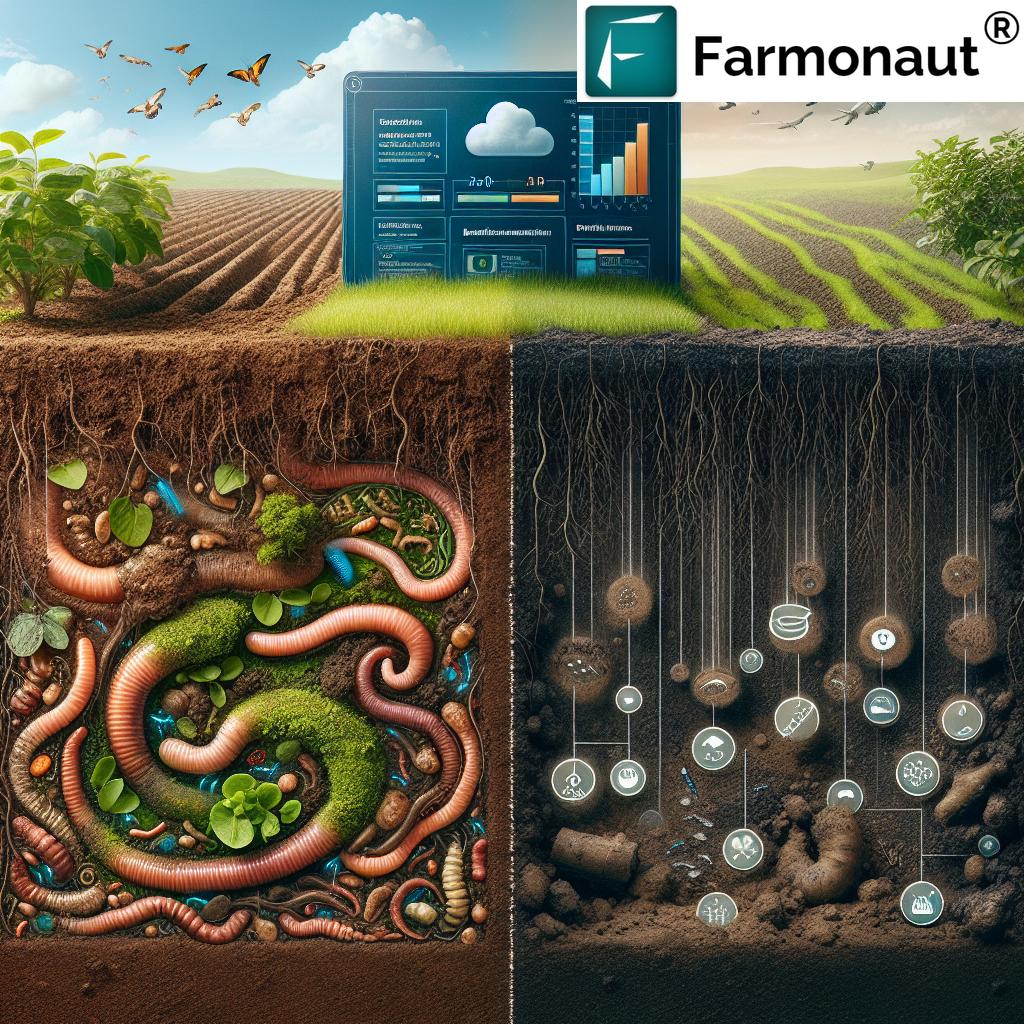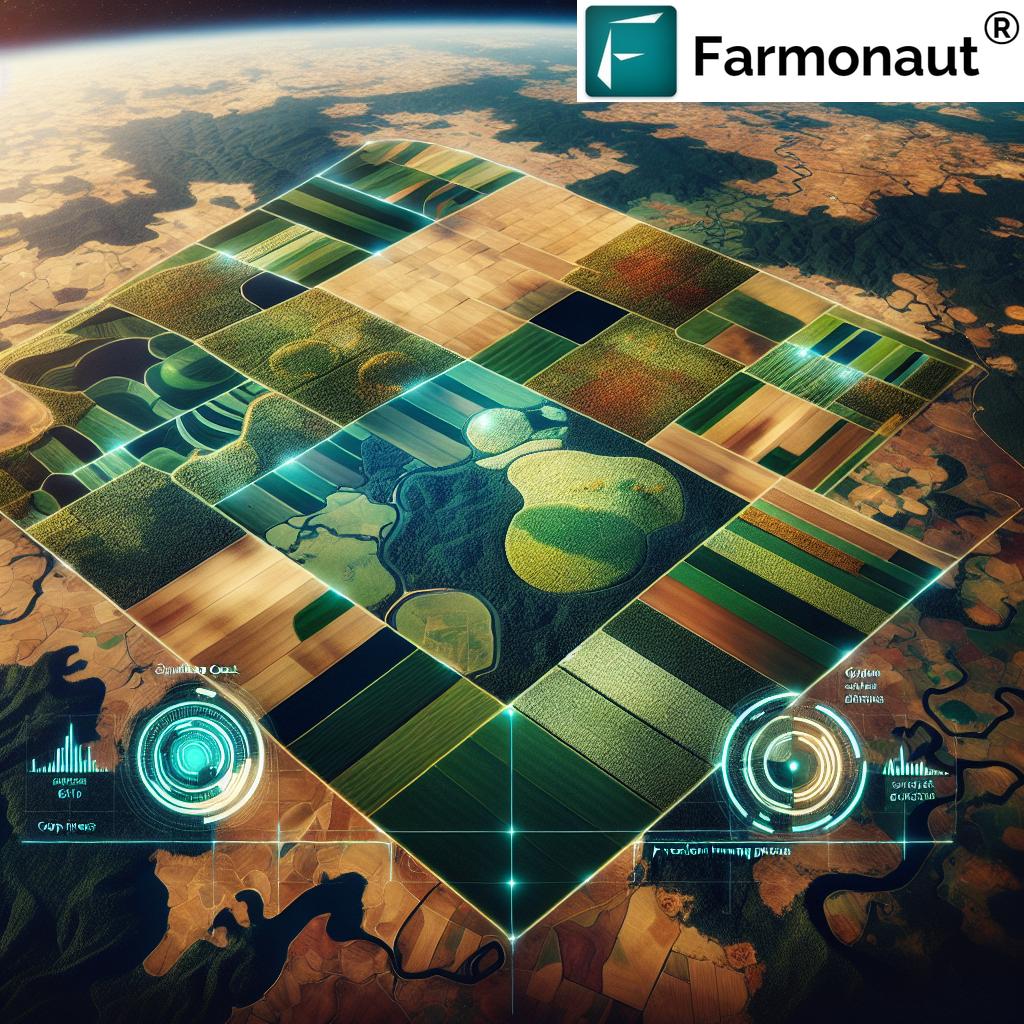Mastering Grain Marketing: Farmonaut’s Guide to Sustainable and Profitable Farming in QLD’s Volatile Markets
“The Grain Marketing Workshop 2.0 in Pittsworth, QLD, offers 100% free expert insights on navigating volatile markets for Australian grain producers.”
Welcome to Farmonaut’s comprehensive guide on mastering grain marketing and sustainable farming practices in Queensland’s ever-changing agricultural landscape. As pioneers in agricultural technology, we’re excited to share valuable insights that will help you navigate the volatile grain markets and boost your farm’s profitability.
In this blog post, we’ll explore cutting-edge grain marketing strategies, sustainable farming practices, and how innovative technologies like Farmonaut’s satellite-based solutions can revolutionize your approach to agriculture. Let’s dive into the world of Australian agriculture innovation and discover how you can stay ahead in today’s dynamic market environment.
The Importance of Grain Marketing in QLD’s Volatile Markets
Queensland’s grain industry is a vital component of the Australian agricultural sector, but it faces significant challenges due to market volatility. Understanding and implementing effective grain marketing strategies is crucial for growers to maintain profitability and sustainability in these uncertain times.
- Market volatility impacts grain prices and farm income
- Effective marketing strategies can mitigate risks and maximize returns
- Adapting to changing market conditions is essential for long-term success
At Farmonaut, we recognize the importance of equipping farmers with the tools and knowledge needed to navigate these challenges. Our satellite-based farm management solutions provide real-time insights that can inform your marketing decisions and help you stay ahead of market trends.

Innovative Grain Marketing Strategies for Australian Growers
To thrive in Queensland’s grain industry, it’s essential to adopt innovative marketing strategies that align with current market trends and your farm’s specific needs. Let’s explore some effective approaches:
- Forward Contracting: This strategy involves agreeing to sell your grain at a predetermined price before harvest. It provides price certainty and can protect against market downturns.
- Futures and Options: These financial instruments allow you to hedge against price risks and potentially lock in favorable prices for future grain sales.
- On-Farm Storage: Investing in storage facilities can give you more flexibility in timing your grain sales, allowing you to take advantage of price fluctuations.
- Pool Marketing: Joining a grain pool can spread risk and potentially access better prices through collective bargaining power.
- Direct Selling: Building relationships with end-users can lead to premium prices and more stable demand for your grain.
To help you compare these strategies, we’ve created a comprehensive table:
| Strategy Name | Risk Level | Potential ROI | Market Volatility Suitability | Sustainability Rating | Key Benefits |
|---|---|---|---|---|---|
| Forward Contracting | Low | 5-15% | High | 4/5 | Price certainty, reduced risk |
| Futures and Options | High | 10-30% | High | 3/5 | Price protection, potential for higher returns |
| On-Farm Storage | Medium | 8-20% | Medium | 4/5 | Flexibility in timing sales, quality control |
| Pool Marketing | Low | 3-12% | Medium | 5/5 | Risk spreading, access to professional marketing |
| Direct Selling | Medium | 7-25% | Low | 5/5 | Premium prices, stable demand |
By leveraging Farmonaut’s advanced crop monitoring and yield prediction tools, you can make more informed decisions when implementing these strategies. Our satellite-based technology provides accurate, real-time data on crop health and potential yields, giving you a competitive edge in the market.
Explore Farmonaut’s capabilities:
Sustainable Farming Practices for Long-term Profitability
“Australian grain producers can learn about the national sustainability framework’s impact on 100% of the grain industry at this workshop.”
Sustainability is no longer just a buzzword; it’s a crucial aspect of modern farming that can significantly impact your bottom line. By adopting sustainable practices, you can improve soil health, reduce input costs, and potentially access premium markets for environmentally friendly produce.
- Implement crop rotation to improve soil fertility and reduce pest pressure
- Utilize precision agriculture techniques to optimize resource use
- Adopt conservation tillage methods to preserve soil structure and moisture
- Integrate cover crops to enhance soil organic matter and prevent erosion
- Employ integrated pest management to reduce reliance on chemical pesticides
Farmonaut’s satellite-based monitoring system can help you implement these practices more effectively by providing detailed insights into your farm’s health and resource needs.
Leveraging Technology for Better Farm Management
In today’s digital age, technology plays a crucial role in optimizing farm operations and marketing strategies. Farmonaut’s suite of tools can help you make data-driven decisions that improve your farm’s efficiency and profitability.
- Satellite-Based Crop Health Monitoring: Our advanced imagery provides real-time insights into vegetation health, soil moisture levels, and other critical metrics.
- AI-Powered Advisory System: Receive personalized recommendations based on your farm’s specific conditions and market trends.
- Blockchain-Based Traceability: Enhance trust and transparency in your supply chain, potentially opening up premium market opportunities.
- Resource Management Tools: Optimize your use of water, fertilizers, and other inputs to reduce costs and improve sustainability.
By integrating these technologies into your farming practices, you can gain a competitive edge in the market and make more informed marketing decisions.

Navigating Agricultural Market Volatility
Market volatility is a constant challenge in the grain industry, but with the right tools and strategies, you can turn it into an opportunity. Here are some key approaches to managing market risks:
- Stay Informed: Regularly monitor market trends, weather forecasts, and global events that could impact grain prices.
- Diversify Your Marketing Approach: Don’t rely on a single strategy; combine different methods to spread risk.
- Use Price Risk Management Tools: Consider options like futures contracts or forward selling to protect against price drops.
- Build Strong Relationships: Cultivate connections with buyers, agronomists, and other industry professionals for valuable insights and opportunities.
- Utilize Technology: Leverage platforms like Farmonaut to access real-time data and make informed decisions.
Remember, successful navigation of volatile markets often comes down to having accurate, timely information at your fingertips. This is where Farmonaut’s technology can give you a significant advantage.
The Role of the National Sustainability Framework in Grain Production
The Australian grain industry is increasingly focusing on sustainability, with the National Sustainability Framework playing a crucial role. This framework aims to ensure the long-term viability of grain production while meeting consumer demands for sustainable products.
- Promotes best practices in environmental stewardship
- Encourages efficient resource use and waste reduction
- Supports social responsibility and community engagement
- Enhances the industry’s reputation and market access
By aligning your farming practices with this framework, you can potentially access new markets and premium prices for sustainably produced grain. Farmonaut’s tools can help you track and demonstrate your sustainability efforts, providing valuable data for certification processes and market differentiation.
Enhancing On-Farm Decision Making
Making informed decisions is crucial for the success of your grain farming operation. Farmonaut’s advanced analytics and AI-powered insights can significantly improve your decision-making process in several key areas:
- Crop Planning: Use historical data and predictive analytics to choose the most profitable crops for your land.
- Resource Allocation: Optimize the use of water, fertilizers, and other inputs based on real-time crop needs.
- Pest and Disease Management: Identify potential issues early and take targeted action to minimize crop damage.
- Harvest Timing: Determine the optimal time for harvest based on crop maturity and market conditions.
- Marketing Decisions: Use yield predictions and market insights to make informed selling decisions.
By leveraging these tools, you can minimize risks, reduce costs, and maximize your farm’s profitability.
The Future of Grain Farming in Queensland
As we look to the future, the grain industry in Queensland is poised for significant changes and opportunities. Here are some trends and developments to watch:
- Climate-Resilient Crops: Development of grain varieties that can withstand extreme weather conditions.
- Precision Agriculture: Increased adoption of technologies like Farmonaut for more efficient farming practices.
- Alternative Markets: Growing demand for specialty grains and plant-based proteins.
- Carbon Farming: Potential for additional income through carbon sequestration initiatives.
- Digital Integration: Greater connectivity between farm operations, supply chains, and end markets.
By staying informed about these trends and adapting your farming practices accordingly, you can position your operation for long-term success in the evolving agricultural landscape.
Empowering Women in Agriculture
The role of women in agriculture is becoming increasingly recognized and celebrated. In Queensland’s grain industry, women are making significant contributions as farmers, agronomists, researchers, and industry leaders. Here’s how we can continue to support and empower women in agriculture:
- Promote equal access to resources, training, and technology
- Encourage mentorship programs and networking opportunities
- Highlight success stories of women in the grain industry
- Support work-life balance initiatives in rural communities
- Advocate for gender-inclusive policies in agricultural organizations
At Farmonaut, we’re committed to supporting diversity and inclusion in agriculture, recognizing that a more diverse industry leads to greater innovation and resilience.
Conclusion: Embracing Innovation for a Sustainable Future
As we’ve explored throughout this guide, mastering grain marketing and embracing sustainable farming practices are key to thriving in Queensland’s volatile agricultural markets. By leveraging innovative technologies like Farmonaut’s satellite-based solutions, staying informed about market trends, and adapting to changing conditions, you can position your farm for long-term success and profitability.
Remember, sustainable and profitable farming is not just about adopting new technologies – it’s about integrating these tools with your expertise and experience to make better decisions for your farm and the environment. As you continue on this journey, Farmonaut is here to support you with cutting-edge solutions and insights.
Ready to take your grain farming to the next level? Explore Farmonaut’s suite of tools and services:
For developers:
API
API Developer Docs
FAQ Section
Q: How can Farmonaut help me improve my grain marketing strategies?
A: Farmonaut provides real-time satellite imagery and AI-powered insights that can help you make more informed decisions about when to sell your grain. Our crop health monitoring and yield prediction tools give you a competitive edge in understanding your potential harvest, allowing you to time your market entry more effectively.
Q: Is Farmonaut suitable for small-scale grain farmers?
A: Absolutely! Farmonaut is designed to be accessible and affordable for farmers of all scales. Our subscription-based model allows you to choose the services that best fit your needs and budget, making precision agriculture accessible to small and medium-sized farms.
Q: How accurate is Farmonaut’s crop health monitoring?
A: Farmonaut uses high-resolution satellite imagery and advanced AI algorithms to provide highly accurate crop health assessments. While exact accuracy can vary depending on factors like cloud cover and crop type, our technology consistently delivers reliable insights that have helped farmers across various regions improve their crop management.
Q: Can Farmonaut help me with sustainability certification processes?
A: Yes, Farmonaut’s data and analytics can be valuable for sustainability certification processes. Our platform provides detailed records of your farming practices, resource usage, and environmental impact, which can be used to demonstrate compliance with various sustainability standards and frameworks.
Q: How often is Farmonaut’s satellite data updated?
A: The frequency of updates depends on the subscription tier you choose. Our standard plans typically offer updates every 3-5 days, while premium plans can provide more frequent updates. This ensures you have access to timely information for making critical farming decisions.
















